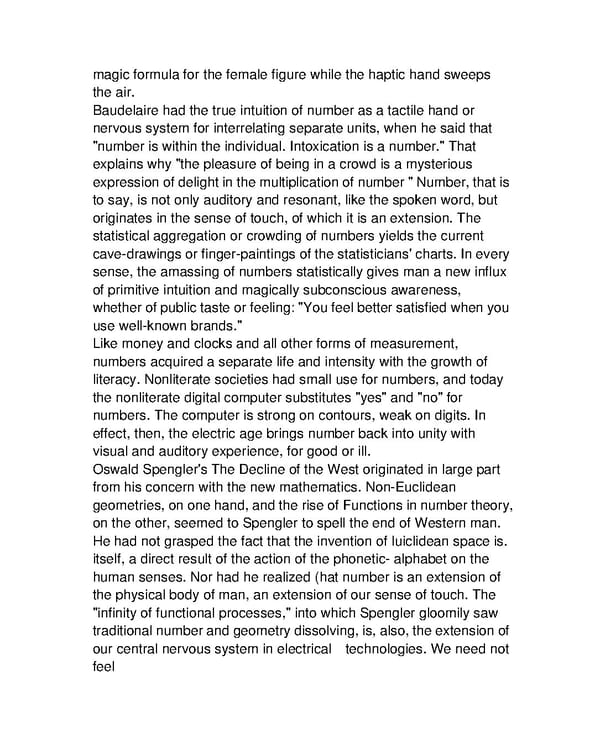magic formula for the female figure while the haptic hand sweeps the air. Baudelaire had the true intuition of number as a tactile hand or nervous system for interrelating separate units, when he said that "number is within the individual. Intoxication is a number." That explains why "the pleasure of being in a crowd is a mysterious expression of delight in the multiplication of number " Number, that is to say, is not only auditory and resonant, like the spoken word, but originates in the sense of touch, of which it is an extension. The statistical aggregation or crowding of numbers yields the current cave-drawings or finger-paintings of the statisticians' charts. In every sense, the amassing of numbers statistically gives man a new influx of primitive intuition and magically subconscious awareness, whether of public taste or feeling: "You feel better satisfied when you use well-known brands." Like money and clocks and all other forms of measurement, numbers acquired a separate life and intensity with the growth of literacy. Nonliterate societies had small use for numbers, and today the nonliterate digital computer substitutes "yes" and "no" for numbers. The computer is strong on contours, weak on digits. In effect, then, the electric age brings number back into unity with visual and auditory experience, for good or ill. Oswald Spengler's The Decline of the West originated in large part from his concern with the new mathematics. Non-Euclidean geometries, on one hand, and the rise of Functions in number theory, on the other, seemed to Spengler to spell the end of Western man. He had not grasped the fact that the invention of luiclidean space is. itself, a direct result of the action of the phonetic- alphabet on the human senses. Nor had he realized (hat number is an extension of the physical body of man, an extension of our sense of touch. The "infinity of functional processes," into which Spengler gloomily saw traditional number and geometry dissolving, is, also, the extension of our central nervous system in electrical technologies. We need not feel
 Understanding Media by Marshall McLuhan Page 123 Page 125
Understanding Media by Marshall McLuhan Page 123 Page 125